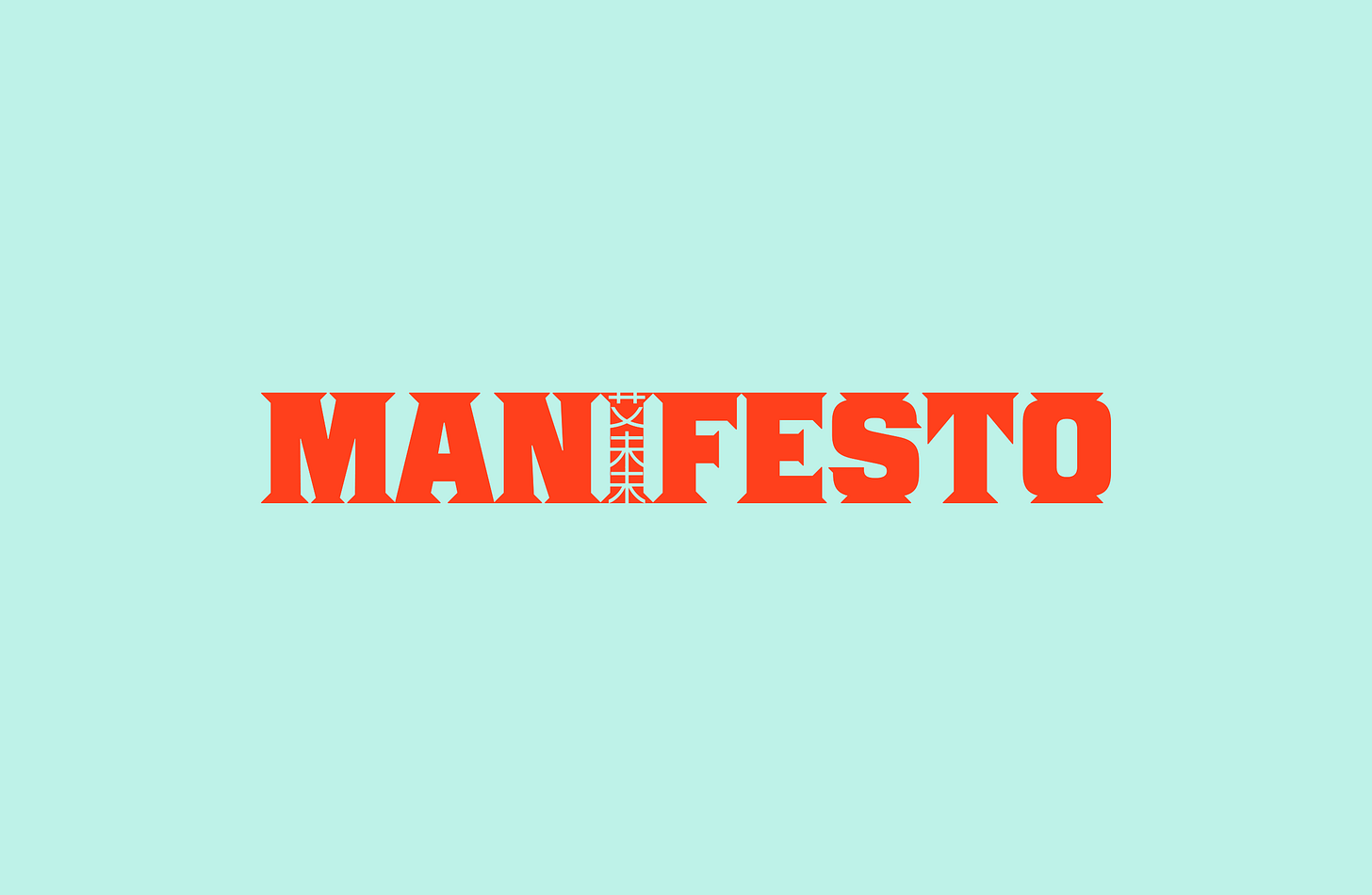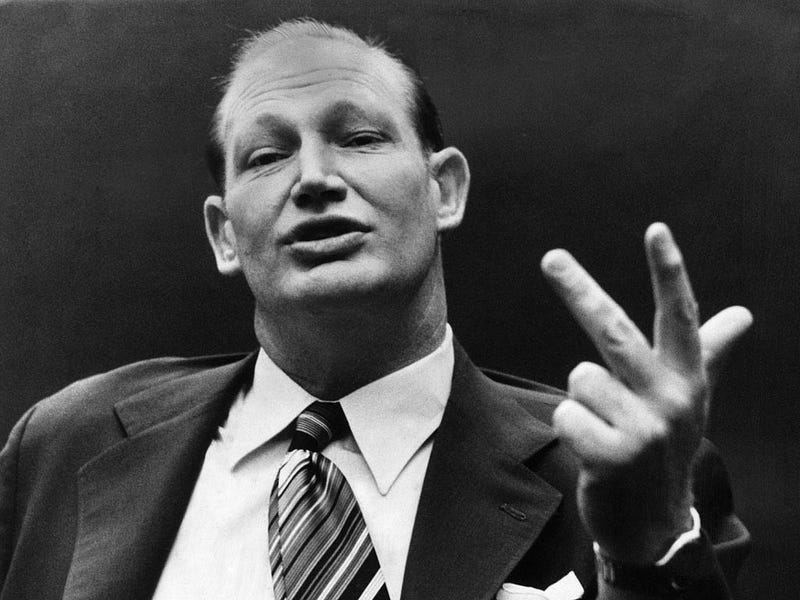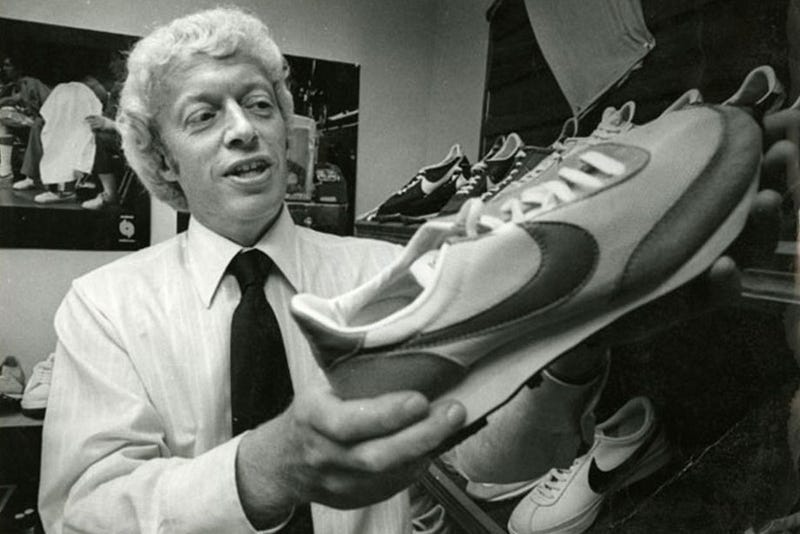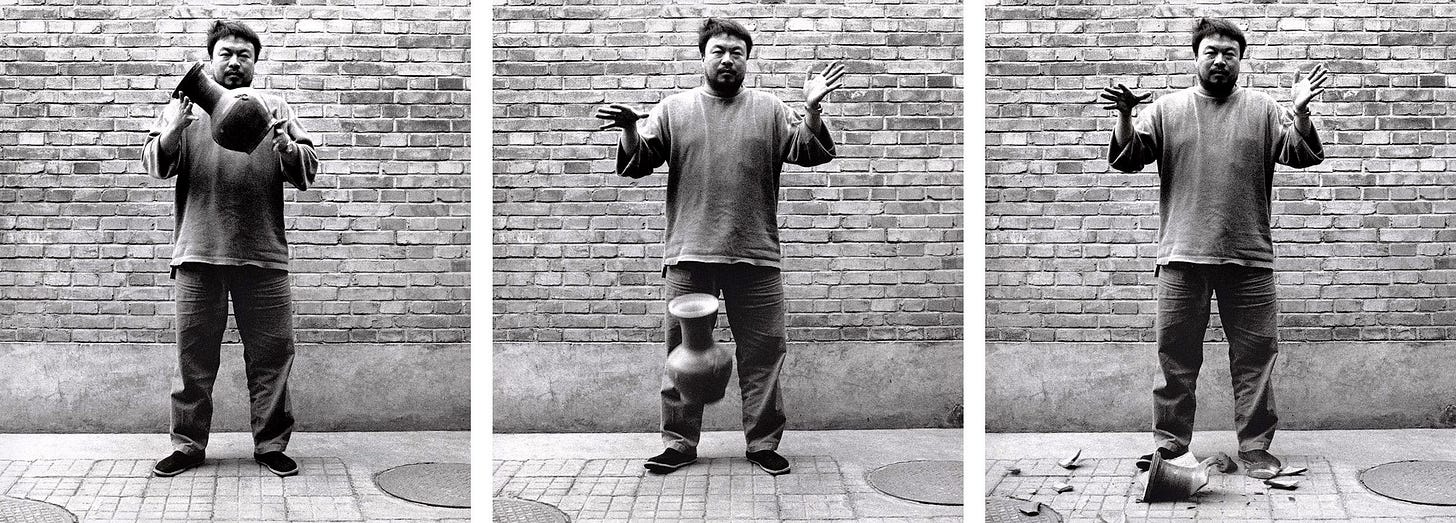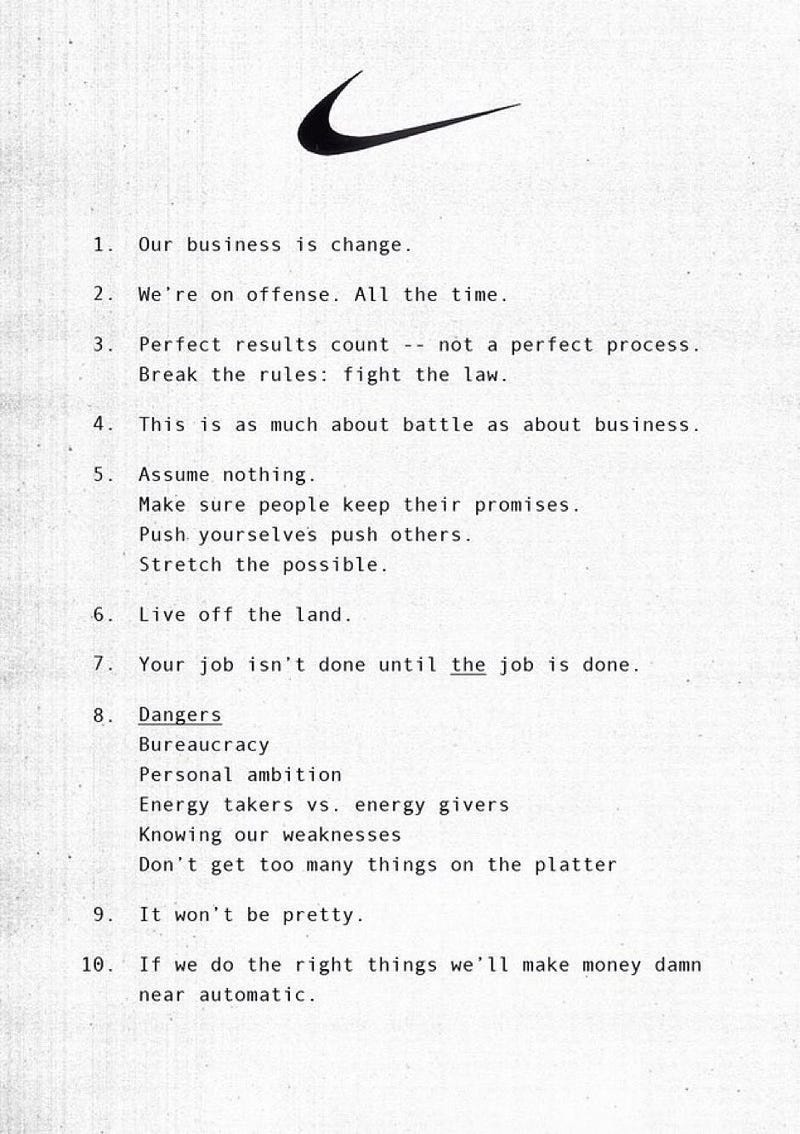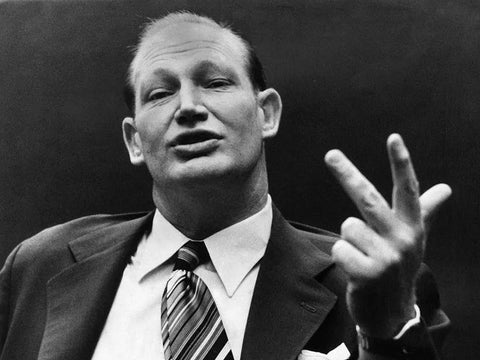
The Rise & Rise of a Manifesto
Rules for life, business and creativity.
I’ve owned the book The Rise & Rise of Kerry Packer four times. Each copy came to me at a different crossroads, as if the universe knew when I’d need it most. The first was a gift from my mum on my 21st birthday. Maybe she saw that I was wrestling with questions — curious about my parent’s business path. I’ve always had a habit of giving things away, especially books. There’s something about a book that feels richer in a new reader’s hands, the story finding new life with each person it touches. So, naturally, that first copy didn’t stay with me long.
Seven years later, at 28, my wife Nicola handed me a new copy, a hardback, solid and unyielding. It came to me when I was deep in the weeds of running my first business, SMI. At that point, the thrill of starting something from scratch had been replaced by the weight of keeping it afloat. Risks were piling up, and responsibility was pressing down harder than anticipated. Though I didn’t fully understand why, the book felt like a lifeline.
When I turned 40, my friend Webby bought me a copy. The book had become like an old friend — the kind that shows up uninvited drops cryptic advice and somehow leaves you better for it. It was as if the universe was nudging me to look back and maybe absorb something I’d missed. Each time I opened the pages, I found something new, a different insight that seemed to know exactly where I was as if the book had been evolving.
The Rise & Rise of Kerry Packer is not a self-help book, nor was Kerry Packer a conventional business role model. His life was marked by ambition, audacity, and unapologetic self-confidence — traits that, while sometimes outrageous, are compelling for anyone in business or leadership. For me, the book offers more than a study in boldness; it challenges readers to consider their boundaries and values. Do you resonate with Packer’s decisions? Are there places where you’d do things differently?
Ultimately, the book’s true value is in the reflection it sparks. It challenges you to examine your limits and your approach to risk. In that sense, it’s less about Packer’s insights and more about the space it creates for self-reflection. Each time I returned to it, I saw my path reflected back at me, not in Packer’s choices but in the questions his life stirred within me.
Starting my first business was terrifying. SMI — short for Surf & Mountain Industries (in reality, borrowed from Jerry Maguire, where Tom Cruise’s character worked at “SMI”) was a venture demanding capital, risk, and expertise well beyond my reach at the time. I knew next to nothing about business. I had the drive, the energy, and an almost blind desire to create, but I lacked any real sense of direction or guiding principles. It was like having a powerful engine but no map — moving forward on raw ambition alone, hoping I’d figure it out. The idea of a manifesto to ground or align me with a deeper purpose wasn’t even on my radar.
But that lack of direction came with a price. Every decision felt like guesswork, every setback a weight without an apparent reason to lift it. Without a manifesto and a “why” that went beyond survival, I hesitated, stumbling through choices that often felt empty and reactive rather than driven by a more profound sense of purpose.
Looking back at my early days with SMI, I see how much time I spent hesitating and second-guessing myself. Without a clear set of values to guide me, I was easily swayed by the pressures around me. I wanted to succeed but wasn’t always sure what success meant. I had the hustle but lacked the clarity to channel it with conviction.
Of course, in time, I was surrounded by mentors, leaders, colleagues, friends, and books, all of whom became my guides. However, the idea of a manifesto didn’t enter my life until much later in my business journey.
Like many starting, my business heroes were the classics: Richard Branson, Steve Jobs, and all the heavyweights. I read Rich Dad Poor Dad (I thought it was a bit crap, to be honest), The 7 Habits of Highly Effective People by Stephen Covey, Good to Great by Jim Collins, and every book Seth Godin ever wrote. As I read, I wrote pages of notes, capturing every insight that leapt off the page. These ideas resonated with me, and I noticed my thinking evolve in capturing them. My scattered notes slowly began to form my values, a personal framework for how I wanted to build and lead my business.
Over time, my company started defining its values. We learned what mattered to us and what we stood for. Eventually, those values coalesced into a manifesto—one that, to this day, we live by.
I remember reading Nike’s manifesto, penned by Phil Knight in 1980.
Knight’s manifesto is blunt and unapologetic, encapsulating his approach to leading Nike into one of the world’s most iconic brands. “Our business is change,” he declares, suggesting that adaptability isn’t just an option; it’s a necessity. He emphasises that to lead in business, you must be willing to challenge the status quo and to innovate relentlessly. “We’re on offence. All the time”. Knight’s proactive and aggressive approach focuses on driving the pace rather than following it. “Perfect results count — not an ideal process. Break the rules; fight the law”. Knight prioritises the result over following a process, encouraging creative problem-solving and pushing boundaries to get the job done. Business is as much a battlefield as anything else. Resilience, tenacity, and a fighting spirit are essential for survival and success.
“Assume nothing. Make sure people keep their promises. Push yourselves, push others. Stretch the possible”. This mindset promotes scepticism and accountability, urging people to hold themselves and others to high standards, push boundaries, and always go beyond what seems possible. Knight’s emphasis on resourcefulness — “Live off the land” — champions resilience and finding ways to thrive. His manifesto concludes with a simple but powerful idea: “If we do the right things, we’ll make money damn near automatic”, trusting that integrity and hard work would pave the way to long-term success.
Reading Knight’s manifesto was a revelation and a blueprint for success that transcended industries and eras. His words had the courage and clarity I realised were missing in my business. Knight showed that a manifesto could be a living, breathing set of commitments that drives every decision and every action. Over time, these insights pushed me to think critically about the values I wanted my business to reflect and how I could set a standard that guided my decisions and those of everyone in the company.
Ai Weiwei is a powerhouse in art and activism, known for his fearless critique of political oppression and his unwavering commitment to human rights. As one of the most influential artists of our time, Ai’s work challenges conventions head-on, often putting him at odds with the Chinese government. His boldness has landed him in prison and earned him a global following. But his philosophy resonates beyond his art — a way of living and creating that refuses to bow to external pressures.
One of the rules from his manifesto is deceptively simple (the ten are at the end of this article), “Be true in word and resolute in deed,”. In the early days of my business, I often felt unspoken pressure to adapt and be the person others expected or wanted me to be. Business has a way of testing your integrity, tempting you with shortcuts or easy compromises to get the deal done. It’s a slippery slope, and I slid down it more than once. These little bends away from my values seemed minor initially and easy to justify. But Ai’s rule taught me that these small compromises accumulate like dents in a car. One ding may not seem like much, but over time, those tiny marks add up, leaving you with something that doesn’t quite feel like it’s yours anymore (and ends up looking like shit!).
And these minor dents don’t just build up in cars — they accumulate in life and business. Running SMI without a manifesto was like driving a vehicle that gradually picked up more and more dings along the way. Each small compromise, each little dent, created a gap between who I was and who I presented myself to be. Ai Weiwei captures this idea perfectly in his sixth rule: “Harmonise your external appearance with your innermost thoughts.” Authenticity is the alignment between what’s inside and what we show the world. Those little dents I ignored? They were the distance between my actions and my true self.
As my journey continued, I understood what Ai Weiwei meant in his fourth rule: “Find out what ‘I’ means and find your own identity.” That identity — our manifesto — isn’t something we’re born with, and it’s certainly not fixed. We uncover it gradually through experiences, missteps, and a willingness to reflect honestly. Seventy thousand later, while writing my book, I realised that my manifesto had been evolving all along, shaped by each new insight, each hard-earned lesson. It wasn’t about locking down a rigid set of values but about moving in a true direction, allowing my principles to grow and change as I did.
There’s humility in recognising that we don’t have all the answers.“Be modest, open-minded, and receptive like an echoing canyon.” It’s the humility of perspective, and that's why I love the story of the two shoe salesmen from The Art of Possibility. In the story, a shoe company sends two marketing scouts to a remote African region to assess the potential for selling shoes. One returns disheartened, saying, “Situation hopeless — no one here wears shoes.” The other sees things differently: “Glorious business opportunity — they have no shoes!” The same scenario, two completely different interpretations.
That story stays with me because it reminds me of how our perspectives shape the meaning we give to our work and lives. Over the years, I could have seen my business — first SMI and now Reny ® — as just another agency, a means to an end. Or I could see it as a platform for pioneering change, for creating something that connects with people and leaves a positive impact — the same work, but with vastly different energy and intention behind it.
Today, Reny® reflects my evolution as a business owner, person, father, husband, and friend. Each role is challenging, but aligning them with my manifesto has been a source of ambition and comfort. It gives me a sense of direction, a guide to walk a path I hope will leave meaningful footprints.
A manifesto is an active force that drives action. A person’s worth is determined by how much they can set aside their ego and replace it with respect for others. The manifesto is a way to show up in the world with integrity, recognising that our purpose is part of something larger, our contribution to the collective story, our way of shaping the world.
In July 2024, I received an unexpected call from Dave Murphy at ReWild Projects about a confidential project. True to our values, we hold a strong stance on knowing who we’re working for and why. As the details unfolded, I learned that the client was the Packer Family Foundation, operated by Gretel Packer, Kerry Packer’s daughter. It felt surreal — like a full circle. The book that had found its way to me over the years, guiding me in times of need, manifested in the real world, now collaborating with the family whose story had served as my compass.
Perhaps a manifestation?
After 25 years in business, countless copies of The Rise & Rise of Kerry Packer, and numerous dents in my car (business and ego), my manifesto has evolved from a hunger for success to a desire for impact. It has transformed me from ambition to value, guiding, challenging, and sometimes redirecting me.
The question isn’t whether your manifesto will change — it’s whether you’ll allow it to guide you somewhere new. And if it does, maybe that’s precisely the point.
Reny Studio Manifesto
No Bullshit
We value honesty and directness in our communication and actions. We cut through the noise to deliver straightforward, impactful solutions. This no-nonsense approach ensures transparency and builds trust with our clients and partners.
We Celebrate Emotion
Emotions are at the heart of our creative process. We embrace the power of storytelling and design to evoke genuine human connections. Celebrating emotion helps us create meaningful and memorable experiences that resonate with people.
Humanity-Centred
Our design approach prioritises people. We focus on creating solutions that enhance human experiences and well-being. By putting humanity at the centre of our work, we ensure that our designs are inclusive, empathetic, and impactful.
People Over Consumption
We prioritise the needs and well-being of people over the drive for consumption. Our designs aim to foster meaningful, sustainable lifestyles. This principle helps us create value-driven products that benefit society rather than promoting unnecessary consumption.
Planet Over Profit
Environmental sustainability is non-negotiable. We choose projects and partners that prioritise the health of our planet, even if it means sacrificing profit. This commitment to the planet ensures that our work contributes to a sustainable future.
Hierarchies are so 1985
We believe in flat, collaborative structures. Everyone’s voice matters; great ideas can come from anywhere within our team. This approach fosters innovation and ensures all team members are valued and heard.
Community Matters
We are deeply committed to the communities we serve. Our work is driven by the desire to impact society positively. By prioritising community, we ensure that our designs are socially responsible and beneficial.
Take Risks, Being Overlooked is OK
Innovation requires courage. We embrace risks and view failures as opportunities for learning and growth. Taking risks allows us to push the boundaries of design and create groundbreaking solutions.
What’s Right Over What Pays (Art Matters)
We stand by our principles and prioritise doing what’s right over what’s profitable. Art and integrity guide our creative decisions. This value ensures that our work is ethically sound and culturally enriching.
Take Work Seriously, Not Ourselves
We are dedicated to delivering exceptional work but don’t take ourselves too seriously. Kindness and humility are key to our culture. This balance helps us maintain a positive, productive work environment while delivering high-quality designs.
Weiwei’s Manifesto thanks to WeTransfer
1. “Do the right thing without hesitation. Don’t let society’s constraints and expectations prevent you from pursuing the truth. Life is important, but life without meaning is not worth living.”
2. “Be true in word and resolute in deed. Keep your word; what is said should be done. With everything we do, we should persist until it is completed.”
3. “Be modest, open-minded, and receptive like an echoing canyon. The more you know, the more you realise how much you don’t know. Facing the vast mystery of the universe, our individual experiences are insignificant and not worth mentioning.”
4. “Find out what ‘I’ means and find your own identity. Who I am should be consistent with what I do, how I behave, and how I act. Persist, no matter what other people say.”
5. “Use your own way of being, in an existentialist manner, to set the standard, and determine moral codes and rules of behavior.”
6. “Harmonize your external appearance with your innermost thoughts. What we present to the outside world should be congruent with the quality of our inner world. We see a lot of discordance between what a person appears to be and what a person really is nowadays, but the harmony between the two is actually how an individual becomes an individual.”
7. “Take a lot of interest in history and past experience, but also seek out new knowledge. Be imaginative, and desire things that have not happened yet.”
8. “Do things in life by non-interference and lead a life through natural rhythms. The human mind and nature are sometimes contradictory forces, but let nature take its course. By ‘nature,’ Chinese people refer to the laws of the universe.”
9. “Do not do to others what you would not have them do to you. What we demand of others and of society should correspond to, and stay within, the bounds of what we demand of ourselves.”
10. “A person’s worth is determined by how much they are able to set aside their own ego and replace it with respect for others. Respecting others is respecting yourself, for everyone in the world is interconnected.”

